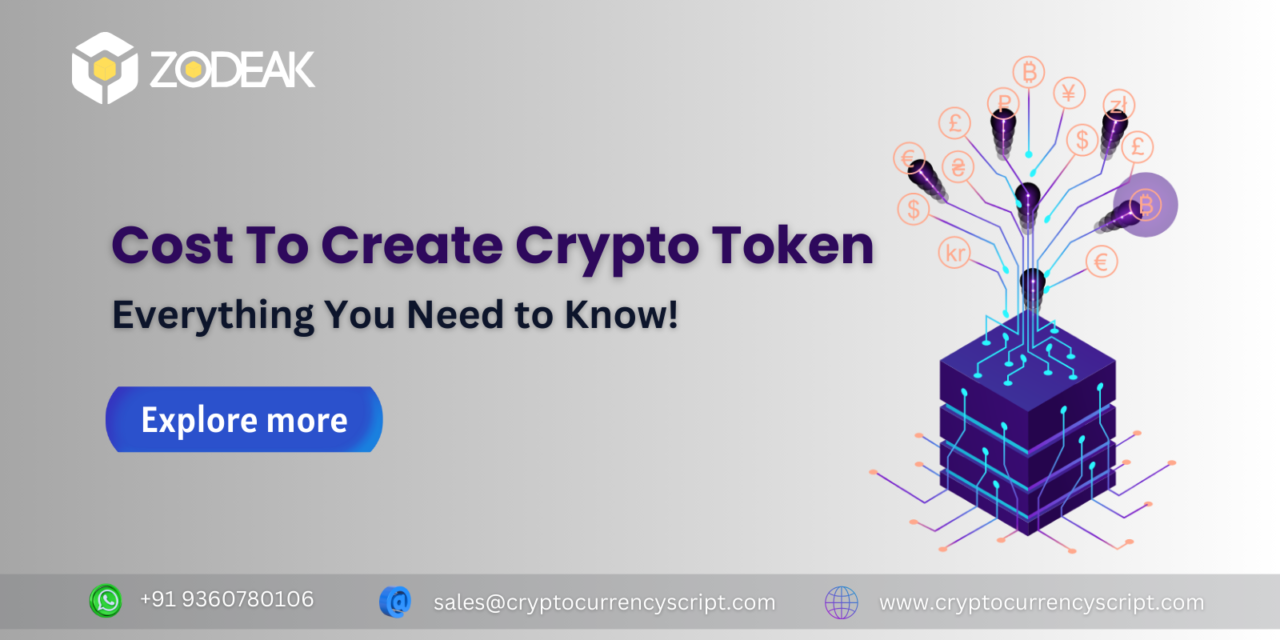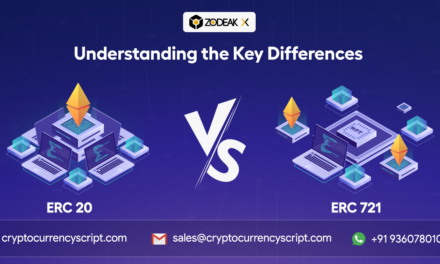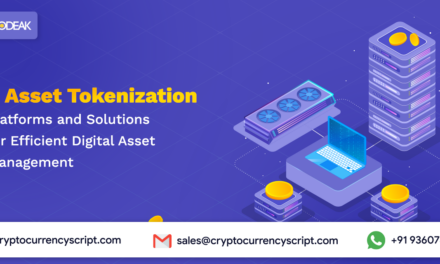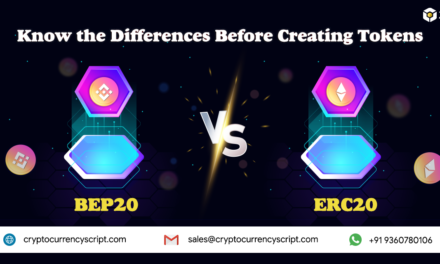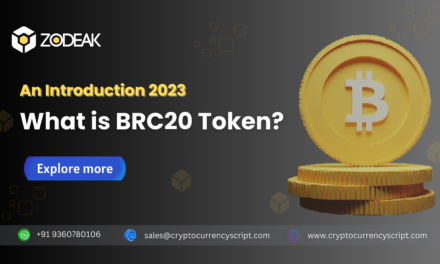Hello everyone! If you landed here to know about the cost to create token, I want to give a super thank you for tapping your index finger on this topic. Before heading into the topic, it is important to cover the basics, which will lead to a clearer picture of what we are looking for!
Let me list out the agenda of this blog first,
- What is a crypto token? And their types.
- Token development process and associated costs.
- How much does it cost to create crypto token?
To begin with,
What is a Crypto Token?
A crypto token is a digitally stored unit of value that represents an asset or specific use case or service. It is a type of cryptocurrency that resides on the blockchain it is created. Based on its nature its functions are defined, this includes utility, security, and governance.
Generally, the crypto tokens for users and creator works differently.
- For Users, it is for investment purposes, staking for rewards, or to make purchases inside the blockchain or specific platform.
- For Creators, It is for raising funds, identity, ownership of collectibles, creating decentralized applications (dApps), or governing their Decentralized Autonomous organization (DAO).
Some may confuse tokens with crypto coins. Are they are same? If not what is the point of difference between them?
Crypto tokens, unlike coins, don’t have their own blockchain. Rather they are just created on the top of any public blockchain by developers for various purposes or services. And these tokens are not mined during the transaction validation process like coins are.
I hope is the point is clear, right? If not then the upcoming line will make you understand,
- Bitcoin, altcoins, crypto tokens, and virtual currencies are all digital currencies.
- Every cryptocurrency can be considered a crypto token, but not every crypto token is a cryptocurrency.
Now it’s super clear, right? If not scroll up a bit and read from what is a crypto token one more time. If done here then move on to see it types next.
Generally, crypto tokens fall into two different categories, each possessing unique features and purposes:
- Fungible tokens
- Non-fungible token (NFT)
Type 1: Fungible Tokens
On a blockchain, fungible tokens are utilized to represent assets that are interchangeable, divisible, and non-unique. Cryptocurrencies are the most common example of fungible tokens since each coin has the same value as any other coin of the same type at any given point in time.
This category further classifies into various types, such as Utility Tokens, Security Tokens, Payment Tokens, Exchange Tokens, and Governance Tokens, each serving specific functions within the blockchain network they are associated with.
Utility Tokens ensure access to particular services on the blockchain.
Security Tokens tokenize financial instruments like bonds and stocks.
Payment Tokens act as a medium of payment both within and outside the blockchain network.
Exchange Tokens are native to decentralized cryptocurrency exchange platforms. Eg, the CAKE token of PancakeSwap.
Governance Tokens empower users to vote on proposals in decentralized platforms, particularly in DeFi-related products.
These fungible tokens can be grouped into categories that are interchangeable and uniform. They can be easily exchanged for other tokens in the same category. Besides, these tokens apply to both real-world and digital assets connected to the everyday items we use. With this, startup founders or individuals can experience the satisfaction of success.
Type 2: Non-Fungible Tokens
Non-fungible tokens represent unique collectible digital assets. Unlike fungible tokens, NFTs cannot be divided or exchanged for others of the same type. In essence, NFTs are exclusive digital identifiers, irreplicable and indivisible, with their authenticity and ownership certified by blockchain records.
Commonly referred to as cryptographic assets, NFTs possess unique identification codes differentiating each item, including ownership details for easy identification and transfer among token holders. NFTs are tradable, with their ownership tracked on the blockchain and transferable by the owner. Creating NFTs is accessible to anyone with professional assistance.
By comprehending the distinct varieties, you can make knowledgeable choices when utilizing cryptocurrency tokens for various objectives, while taking advantage of the benefits they provide in the digital realm.
Now, let’s delve into the second agenda of this blog: the Token development process.
Token Development Process and Associated Costs
As you prepare to step into the token development process, it is crucial to ask yourself fundamental questions. What is the purpose of your token, who are your target customers, and how will they use your token? Once you have provided answers to these questions, you can then proceed to the development stage.
When it comes to creating a crypto token, there are several options available to you. You can either recruit a team of developers from the top crypto token development company to build the token, outsource the development process, or use an asset tokenization platform.
Several key factors can impact the cost of creating your crypto tokens, including:
Token Design
The creation of a cryptographic token necessitates a distinctive design, name, and symbol. A unique and memorable token symbol is crucial, influencing the development costs based on the token’s interface and design.
Token Complexity
Startups seeking to create a premium crypto token may opt for additional features, elevating the project’s complexity. The development of a crypto wallet to store these tokens is mandatory, contributing to the overall cost.
Development Team
The size of the development team also matters which affects your overall cost. A smaller team suffices for lower token supplies, but larger volumes demand more developers within a specified timeframe.
Tech Stack You Prefer
Startups entering the crypto arena often opt for high-end technology stacks. Choosing the best technology, while advantageous for profitability, can be costly. The selection of the tech stack influences the overall cost of token creation.
Features and Functions
The inclusion of unique features distinguishes your crypto tokens from the rest in the market. The costs are influenced by the distinctiveness of these features, contributing to the overall expense of developing a crypto token.
Token Creation and Testing
After defining requirements, engaging a with BEP20 or ERC20 token development company becomes essential. This is because of creating your token, testing it, and deploying it to serve its purpose. This part determines the overall cost, guaranteeing that the final output meets expectations.
Determining the cost of creating crypto tokens involves several crucial factors. Despite considering all these parameters, one can still estimate the approximate cost of creating a crypto token. Hence, our blog’s ultimate focus is on the cost of creating a crypto token.
How Much Does it Cost to Create crypto Token?
The cost to create crypto tokens starts at $3,000 and may vary based on various factors, including token design, complexity, techstack, developers, features, testing, and more.
Some individuals may opt to create tokens independently, while others may be interested in creating crypto tokens in tandem with other products such as wallet development, DAO, or a decentralized exchange. This encompasses the token’s cost and the method of script or development from scratch employed.
For example, combining the cost of creating a token, which starts at $3,000, with the cost of a decentralized exchange script, which starts at $7,000, yields a final cost that allows you to select one of the best combinations for your business venture.
However, Creating your own crypto token can be a costly endeavor, but the potential rewards can be significant. If you’re interested in developing your custom tokens, it’s advisable to work with a reputable crypto token development company like Zodeak.
With their expertise and experience, you can create a unique token that has the potential to make a big impact in the market. Contact Zodeak today to know more about the process and start your journey towards a successful venture.

